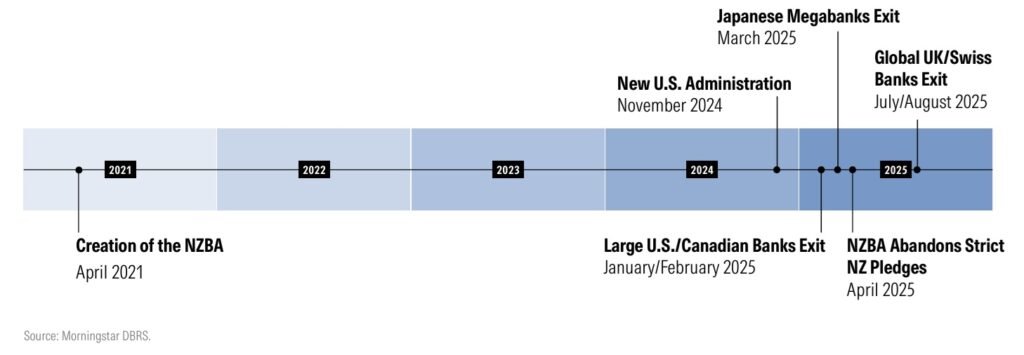- Political shifts push global banks out of NZBA, weakening net-zero goals while EU banks remain committed under regulatory pressure
- European banks stay committed under ECB oversight and legal climate targets
LONDON (India CSR): The Net-Zero Banking Alliance (NZBA), once considered a landmark global initiative, is facing serious challenges. A September 2025 report by Morningstar DBRS titled “Net-Zero Banking Alliance: Political Pressure Materialises in Weakening of Net Zero Commitments Globally” highlights how political headwinds have led to major departures from the alliance.
Morningstar DBRS warns major bank exits from Net-Zero Banking Alliance weaken global climate action and raise future financial stability concerns.
Launched in April 2021 under the United Nations Environment Programme, the NZBA required banks to voluntarily align financing activities with the goal of achieving net-zero greenhouse gas emissions by 2050. However, according to Morningstar DBRS, its collective strength has been undermined in 2025 as political, economic, and regulatory factors drove some of the world’s largest banks to withdraw.
“Whether banks have been opportunistic or pragmatic in their exit of the NZBA, we have observed an increased understanding of climate risks in recent years“, said Vitaline Yeterian, Senior Vice President and Sector Lead of European Financial Institution Ratings at Morningstar DBRS. “However, climate risk strategy and management capabilities remain critical to address climate risks, which we expect to rise over time, while climate-related legal and regulatory risks remain on the horizon”.
As Morningstar DBRS cautions, the coming years will be crucial. Banks’ ability to quantify, disclose, and manage climate risks will not only determine their financial resilience but also their credibility in the fight against global warming.
Political Pressure Spurs Exits
The report points to political shifts in the United States as a key trigger. In early 2025, US banking giants, including J.P. Morgan, Bank of America, Citigroup, Wells Fargo, and Goldman Sachs left the NZBA. Their exits were followed by Canadian majors—Toronto-Dominion Bank, Bank of Montreal, Scotiabank, National Bank of Canada, Royal Bank of Canada, and CIBC—as well as Japan’s megabanks in March.
In April 2025, the NZBA formally abandoned its earlier commitment to restrict global warming to 1.5°C, instead adopting a softer pledge to keep temperatures “well below 2°C.” Morningstar DBRS noted that the summer was marked by further high-profile exits, including HSBC Holdings, Barclays, and most recently UBS Group.
Despite these withdrawals, banks have claimed they will continue pursuing in-house strategies to meet net-zero goals independently, citing strengthened internal capabilities to assess climate risks.

European Banks Hold Ground
Morningstar DBRS underlined that EU-based banks have not left the alliance, largely due to legal obligations. The European Climate Law commits the bloc to climate neutrality by 2050, while the European Central Bank (ECB) enforces regulatory oversight requiring banks to integrate climate risk into their disclosures and stress-testing frameworks.
According to ECB data cited in the report, more than 90% of EU banks now recognise themselves as materially exposed to climate-related risks, a significant rise from 2021 when only half acknowledged such exposure. This progress, the report said, reflects the increasing regulatory push for sustainable finance in Europe.
Rising Climate Risks
Morningstar DBRS warned that the weakening of collective commitments comes at a time when the world is on track for 2.5°C to 3.0°C of warming by 2100, far above the Paris Agreement’s goals. The report stressed that extreme weather events are becoming more frequent and severe, raising physical risks for banks through mortgage portfolios, operational disruption, and sectoral impacts such as tourism.
While transition risks tied to shifting energy systems have temporarily eased, the report cautions they may resurface sharply, demanding costlier adaptation efforts in the years ahead.
Implications for Financial Stability
According to Morningstar DBRS, the exit of global heavyweights is a major setback to coordinated climate action. “The departure of prominent banks from the NZBA is a significant setback to the prospect of a smooth and timely energy transition,” the report observed.
At the same time, the NZBA is moving to transform itself into a framework initiative rather than a membership-based alliance. Analysts believe this could allow banks to share best practices while offering flexibility across jurisdictions, but also warned it risks diluting accountability.
The Net-Zero Banking Alliance today reflects the tension between politics, finance, and climate commitments. While US, Canadian, Japanese, and even some European giants have stepped back, EU banks remain tied to strong regulatory frameworks.
Also read: Political Pressure Undermines Global Net-Zero Banking Efforts: A Timeline of Retreat
(India CSR)





